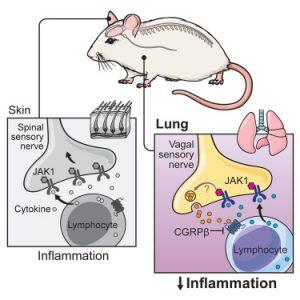In a recent study, researchers described the multifaceted roles of JAK inhibitors in inflammation, shedding light on the need for a more pragmatic approach in their application across varying types of cells and tissues (Figure 1). JAK1, a protein directing cell communication and immune system regulation, plays a crucial role in transmitting signals within cells.
While existing JAK inhibitors effectively combat inflammation in conditions like eczema, this study highlights the necessity for a refined strategy in modulating JAK activity. Researchers suggest a potential shift toward augmenting JAK activity in lung neurons, a departure from conventional JAK inhibitors that predominantly target immune cells.
A significant aspect of this study involved a genetically modified mouse designed with a patient specific JAK1 mutation. This investigation focused on a JAK1 gain-of-function mutation observed in patients with immune dysregulatory and hypereosinophilic syndrome, characterized by severe eczema and asthma. Notably, in the mice’s lung neurons, the JAK1 mutant protein mitigated inflammation triggered by mold exposure by generating inflammation-suppressing substances. However, these mice still exhibited the same skin condition as the original patients. This nuanced understanding underscores the complexities involved in harnessing JAK1 modulation for therapeutic interventions in diverse inflammatory disorders.
Journal article: Tamari, M., et al. 2023. Sensory neurons promote immune homeostasis in the lung. Cell.
Summary by Stefan Botha











